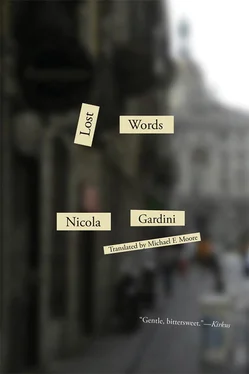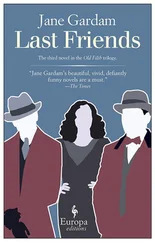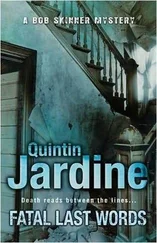They ate heartily. Signora Tavazzi was not particularly friendly — she seemed more shy than suffering, even a little surly, in the unique manner of certain southern Italian women (she was, in fact, from Puglia — she reminded me of one of the tenants, originally from Molfetta, Signora Perotta, who had lived on Via Icaro for only a short time but stood out for her haughty peasant airs). She didn’t even ask mother why her wrists were bandaged, a fact that couldn’t have escaped her. So Mom volunteered the information, though obviously minimizing the gravity of her injuries — the accident was nothing compared to losing two children simultaneously. Signora Tavazzi, having heard the explanation, remained emotionless.
Signor Tavazzi, on the other hand, was cheerful and light-hearted. He treated Dad like an old friend, and Dad played along with it. He was also friendly to Mom and me. In moments of silence he whistled. He spoke to us about Russia — what a strange place! People lining up everywhere, and total silence, even in the subways. Not to mention the prohibitions: don’t go there, stop here… it was all you could do to keep from breaking the rules. The streetcars were operated by women. And everywhere they sold ice cream, even in that polar cold. And the Moscow subway — it reeked! But the Bolshoi was gorgeous. And only the best of the best went to school. And the chambermaids at the hotels, they could be had for the price of a Bic pen. And you could only buy caviar at stores for foreigners. Oh, and another good thing to buy was amber.
“Filomena,” he said to his wife, “show them the necklace I brought you back from Moscow.”
With two fingers, she lifted up a string of pink beads from her chest. Mother exclaimed: “Oh, so that’s what amber is! I thought it was plastic… Filomena, did you go to Russia, too?”
“No, not me…” Pointing to the child sitting next to her, she added, “but he went…”
The boy didn’t bat an eye, as if he hadn’t even been mentioned. He had a nasty look on his face. We didn’t talk at all. He even avoided my gaze. But I was so fascinated by what I knew that I couldn’t take my eyes off of him — although I’d never met them, I could see the faces of his two dead brothers in his stare.
Once the long lunch ended, Dad and Signor Tavazzi went out. Dad had convinced him to go to the movies.
The women started clearing the plates. To break the silence, Mom told Signora Tavazzi, who was passing her the dirty dishes and glasses, that we would soon be moving: the landlord was selling and we were going to buy the Vignolas’ one-bedroom apartment upstairs. The woman, as mechanical as a robot, listened without a trace of curiosity. She said that she and her husband had no intention of buying. They were fine with low-income housing. Some months they didn’t even have to pay rent, since no one would come by to protest. And then, even if they did come by, who cared about the municipality!.. She wouldn’t say a word about the dead children. Not a word, even in passing.
“What a tragedy,” Mom said, to draw her out, unable to restrain herself any longer. “I’m so sorry — did they at least arrest the driver?”
Signora Tavazzi ignored her. Mom found nothing more to say and took a few deep breaths while she dried the dishes.
“The Lord giveth and the Lord taketh away,” the woman said out of the blue, “and we gotta learn to accept everything He sends us.”
*.
Mantegazza threw the grocery bags under the fuse box and flopped down on a chair. It took her a few minutes to catch her breath. She rummaged through her patent-leather purse, lit a cigarette, and after inhaling a puff of smoke, started to speak.
“Elvira, you’re never gonna believe what happened to me today!” She hissed the words, as if a band were playing in the pit of her stomach. “At three in the afternoon, who should arrive, without warning, but the Tax Inspectors! Thank God they wasted time in the Manager’s Office. I rounded up those four southern bumpkins that work off the books. I threw some of our customers’ furs at ‘em and told ‘em to scram for a couple hours. You shoulda seen how happy the real fur coat made ‘em! Would you believe they left by the front door, still wearing their work clogs, and those idiot officers didn’t even notice ‘em? Thank God! Then I scrammed, too…”
“You?!” mother was amazed. “Why would they go after you?”
“I’m retired and getting my pension, my dear Elvira.” She started toying with the doily beneath the ceramic vase. “If they catch me still working — penalties to pay! I didn’t know which way to run. For a second I even thought of diving in the swimming pool. Total desperation. But I hid inside a locker in the locker room. I thought I’d suffocate to death! And those guys took their sweet time. I almost started coughing. God, what torture! I was dying for a cigarette. Finally they left. ‘Everything’s in order,’ they said. What an ordeal! When I stepped out of the locker I was more dead than alive. I told the manager, ‘I’ll be expecting a bonus at the end of the month.’”
Every now and then Mom would give me a look, as if to say, “Does she think we really care about all this baloney!”
Mantegazza seemed to catch her drift.
“Elvira, I’m worried about my mother. She spends too much time alone.”
She opened her purse, took out her compact, checked her makeup.
“And you? Why do you keep working?” mother asked. “If I were you, I’d enjoy my money and call it a day…”
“And then what? Me, sitting around smoking all day?… Ma keeps telling me, ‘Paola, it’s time to retire… you need to rest…’ She wants me to spend my time with her… She’s lonely… Elvira, I was thinking. In the afternoons, around two, you could maybe go upstairs and keep her company? Only for a little while. You could chat, have a cup of coffee… ”
Mother burst out laughing.
“Are you kidding? No way! I have to guard the door. I’d be in big trouble if I stepped away from my post! What kind of a custodian would that make me?… Not to mention the constant threat of burglars!”
The fat powdered cheeks of Mantegazza shook with disapproval — she hadn’t expected no for an answer. She placed the compact back in her purse and started to roll back the edges of the doily.
“But I’d pay you!” she whispered conspiratorially.
“Maybe I could send Chino up,” Mom proposed, after a very short pause for reflection, “He could do his homework while keeping Signora Armanda company…”
The sound of those words knocked the wind out of both Mantegazza and me. She even twisted her head around, as if someone had stuck a knife in her back.
“For heaven’s sake!” she exclaimed, without making the least effort to hide her contempt. “My mother detests children!.. Do you know what I think? My mother could come downstairs to you, here in the loge, and…” Rather than finish her sentence, she removed a can of coffee from one of her shopping bags. “Just half an hour… two or three times a week, after lunch… All you have to do is call her on the intercom and say, ‘Signora Armanda, come on downstairs. We can have a cup of coffee together.’ As if it were the most natural thing in the world…”
“But…” Mom tried to object.
Whatever she was going to say remained stuck in her throat, because at that point Mantegazza opened her wallet and plucked out a nice pink banknote.
“Take it!” she ordered, looking away. “And don’t go telling Signora Armanda I gave it to you, or she’ll start screaming and yelling. You know how she is… She’s still pretty feisty. If she finds out I threw away money on this, there’ll be hell to pay.”
*.
Mantegazza was right: her mother detested children. The first time she came into our apartment, in addition to the disgusted look she gave me, she kicked me in the shins, striking me with the tip of her foot while I was helping her to sit down. My jaw dropped, more from shock than from pain. What had I ever done to her? I barely knew her!
Читать дальше












